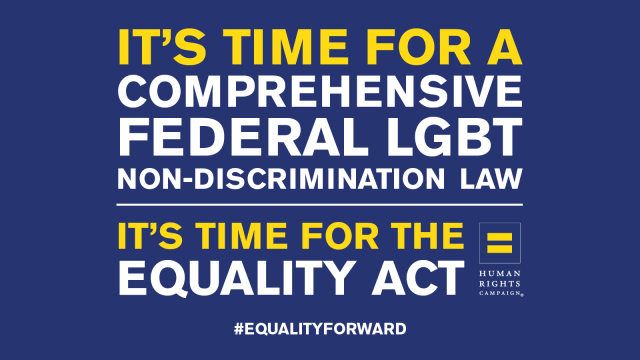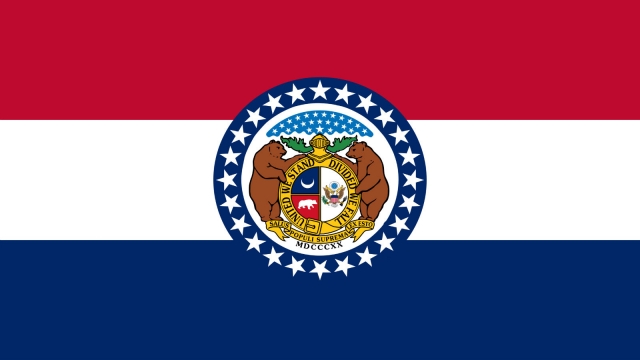HRC Announces 60 Companies Launch Business Coalition for the Equality Act

Today, HRC announced the launch of HRC’s Business Coalition for the Equality Act, a coalition of 60 major employers that have officially endorsed the bipartisan Equality Act.
Since HRC joined with lawmakers and advocates last July to introduce the Equality Act in Congress, HRC has continued to build support from the business community. Today, the Business Coalition for the Equality Act launches with 60 leading American companies. With operations in all 50 states, headquarters spanning 22 states and a combined $1.9 trillion in revenue, the companies that make up the coalition employ over 4.2 million people in the United States.
“These business leaders are showing true leadership and fighting to end a shameful status quo that leaves LGBT people at risk in a majority of states for being denied services or fired because of who they are or who they love,” said HRC President Chad Griffin. “We’re proud of all these corporate leaders stepping forward to say that all Americans, including LGBT people, should be able to live free from fear of discrimination and have a fair chance to earn a living.”
A majority of states — 32 states in total — still lack fully inclusive non-discrimination protections for LGBT people, and there are no explicit federal protections against discrimination. Introduced one month after the historic Supreme Court ruling in Obergefell v. Hodges that ushered in nationwide marriage equality, the Equality Act would finally guarantee explicit, permanent protections for LGBT people under our existing civil rights laws. The Equality Act provides clear, permanent and equal protections under federal law for all Americans in vital areas of life, like employment, access to public spaces, housing, credit, education, jury service, and federally funded programs.
Members of HRC’s Business Coalition for the Equality Act
- Abercrombie & Fitch Co.
- Accenture
- Airbnb Inc.
- Amazon.com Inc.
- American Airlines
- American Eagle Outfitters
- Apple Inc.
- Best Buy Co. Inc.
- Biogen
- Boehringer Ingelheim USA Corp.
- Broadridge Financial Solutions Inc.
- Brown-Forman Corp.
- CA Technologies Inc.
- Caesars Entertainment Corp.
- Capital One Financial Corp.
- Cardinal Health Inc.
- Choice Hotels International Inc
- Corning Inc.
- CVS Health Corp.
- Diageo North America
- Dropbox Inc.
- EMC Corp.
- Facebook Inc.
- Gap Inc.
- General Electric Co.
- General Mills Inc.
- Google Inc.
- Hewlett-Packard Co.
- Hilton Worldwide Inc.
- Hyatt Hotels Corp.
- IBM Corp.
- Intel Corp.
- Johnson & Johnson
- Kellogg Co.
- Levi Strauss & Co.
- Marriott International Inc.
- MasterCard Inc.
- McGraw Hill Financial
- Microsoft Corp.
- Mitchell Gold + Bob Williams
- Monsanto Co.
- Moody’s Corp.
- Nike Inc.
- Oracle Corp.
- Orbitz Worldwide Inc.
- PepsiCo Inc.
- Qualcomm Inc.
- Replacements Ltd.
- Salesforce
- Sodexo Inc.
- Symantec Corp.
- T-Mobile USA Inc.
- Target Corp.
- Tech Data Corp.
- The Coca-Cola Company
- The Dow Chemical Co.
- The Hershey Company
- Twitter Inc.
- Unilever
- WeddingWire Inc.
Today’s announcement comes as dozens of grassroots supporters, advocates and fan out across Capitol Hill to educate Members of Congress about the need to pass the Equality Act. 170 HRC members from 23 states and the District of Columbia are scheduled to visit with 151 offices to grow support for the Equality Act in Congress. In addition to the Equality Act, lobby day participants will urge Senators to support a hearing for President Obama’s forthcoming Supreme Court nomination, among other LGBT equality issues.
Discrimination is a real and persistent problem for too many LGBT Americans. Nearly two-thirds of self-identified LGBT Americans have reported experiencing discrimination in HRC’s polling — including people like Carter Brown, a transgender man who lost his job after he was outed as transgender by his colleagues. Currently, 50 percent of LGBT Americans live in states where they are at risk of being fired, denied housing or refused service because of who they are or whom they love.
HRC’s Business Coalition for the Equality Act launch comes after new polling released by the nonpartisan Public Religion Research Institute (PRRI) found that nationally, support for a bill like the Equality Act topped 70 percent, which includes a majority of Democrats, Republicans and Independents. The groundbreaking report from PRRI included 42,000 interviews in 50 states and found support for the Equality Act in all 50 states.
Republican Senator Mark Kirk (IL) and Representative Bob Dold (IL) recently signed on as co-sponsors of the Equality Act, which was introduced last year by Senators Jeff Merkley (OR), Tammy Baldwin (WI) and Cory Booker (NJ); and Representatives David Cicilline (RI) and John Lewis (GA).
www.hrc.org/blog/hrc-announces-60-companies-launch-business-coalition-for-the-equality-act?utm_source=rss&utm_medium=rss-feed


















 The data comes as GLAAD releases two media guides in its Southern Stories series – one of for journalists reporting on
The data comes as GLAAD releases two media guides in its Southern Stories series – one of for journalists reporting on 




